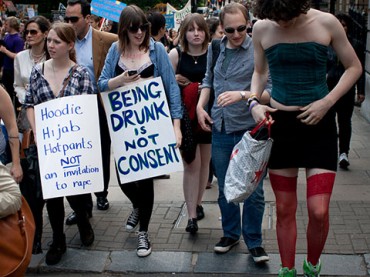
The New York Times has a fascinating look at attitudes and practices around sexual consent at the University of Albany, one of the New York schools subject to heightened “affirmative consent” standards under Democratic Gov. Andrew Cuomo’s executive order last year.
While the author, freelance writer Sandy Keenan, incorrectly equates being “really drunk” with “incapacitation,” her interviews with students and administrators illustrate the low expectations that even supporters have toward the rules, recently enacted across the state:
Tyler Frahme, a University at Albany junior, had never even heard of affirmative consent, the unequivocal O.K. to sex that is mandated by state law. Nor was he in the habit of asking women for permission to proceed at every new juncture of sexual activity. …
Mr. Frahme turned defensive, even a little combative, after I introduced him to the legislation.
“Do you think this is a gender-neutral policy?” he demanded. “All these policies cast men in a predatory light. Most guys aren’t like that.”
Frahme’s female friend denied that it was a “mood kill” to ask for consent, but it’s not clear she realized the law vaguely tells students that getting permission for “one form of sexual activity” doesn’t imply consent for “any other,” and Keenan herself doesn’t seem to realize the murkiness of this directive (what if you change sexual positions without permission?).
“Only a few [students] knew about” the new affirmative-consent regime, Keenan writes:
“The policy has changed but nobody knows,” said Carol Stenger, a sex educator who directs the university’s Advocacy Center for Sexual Violence. …
Ms. Stenger tries to keep her message simple: “Think of it as borrowing a cellphone. You wouldn’t just take it. You’d ask for it first.” She’s been gathering and creating social scenarios to introduce consent at freshman orientation this summer. Upperclassmen will pose provocative statements, especially related to drinking.
Of course, the new regime is more like having to ask for permission to dial every new phone number after borrowing the phone. But Stenger’s tacit message to young women – that they can drink all they want with no consequences – is more troubling:
The biggest challenge Ms. Stenger faces, she says, is addressing the alcohol question because men and women think the situation is a wash when both are inebriated. “It makes me crazy,” she said. “They ask, ‘Am I still a victim?’ Yes!”
Keenan points to research that finds men tend to judge consent from body language, while women are waiting for a verbal request, in keeping with “traditional sexual scripts” that American society has imposed on them:
I met a boisterous foursome of women, all juniors and all transfer students who had gone through orientation last summer. …
After hearing a bit about [affirmative consent], Daniela Kelly said, “Not a lot of people are going to follow that.”
“That’s needed more for hookup culture,” said Shanice Stephenson.
“And besides, it would be impossible to monitor,” said Chinyere Leigh Richardson. “If they’d asked for our input, maybe we’d be more inclined to try it.”
Here’s how Frahme, the skeptical male student from the top, had changed his behavior when talking to Keenan a month later:
He now asks for consent once or twice during sexual encounters with women he knows well, and four or five times during more casual or first-time hookups. …
It’s getting to be a little more comfortable, he said. He crafts and poses questions like “You O.K. with this?” “Do you still want to go ahead?” and “Hey, you don’t have to do this if you don’t want to.”
Yet those “sexual scripts” keep getting in the way: “One woman he was having sex with for the first time accused him of being devious in asking for consent. She thought he was using reverse psychology to get her in bed.”
Like The College Fix on Facebook / Follow us on Twitter
IMAGE: RogaMuffin/Flickr





Please join the conversation about our stories on Facebook, Twitter, Instagram, Reddit, MeWe, Rumble, Gab, Minds and Gettr.